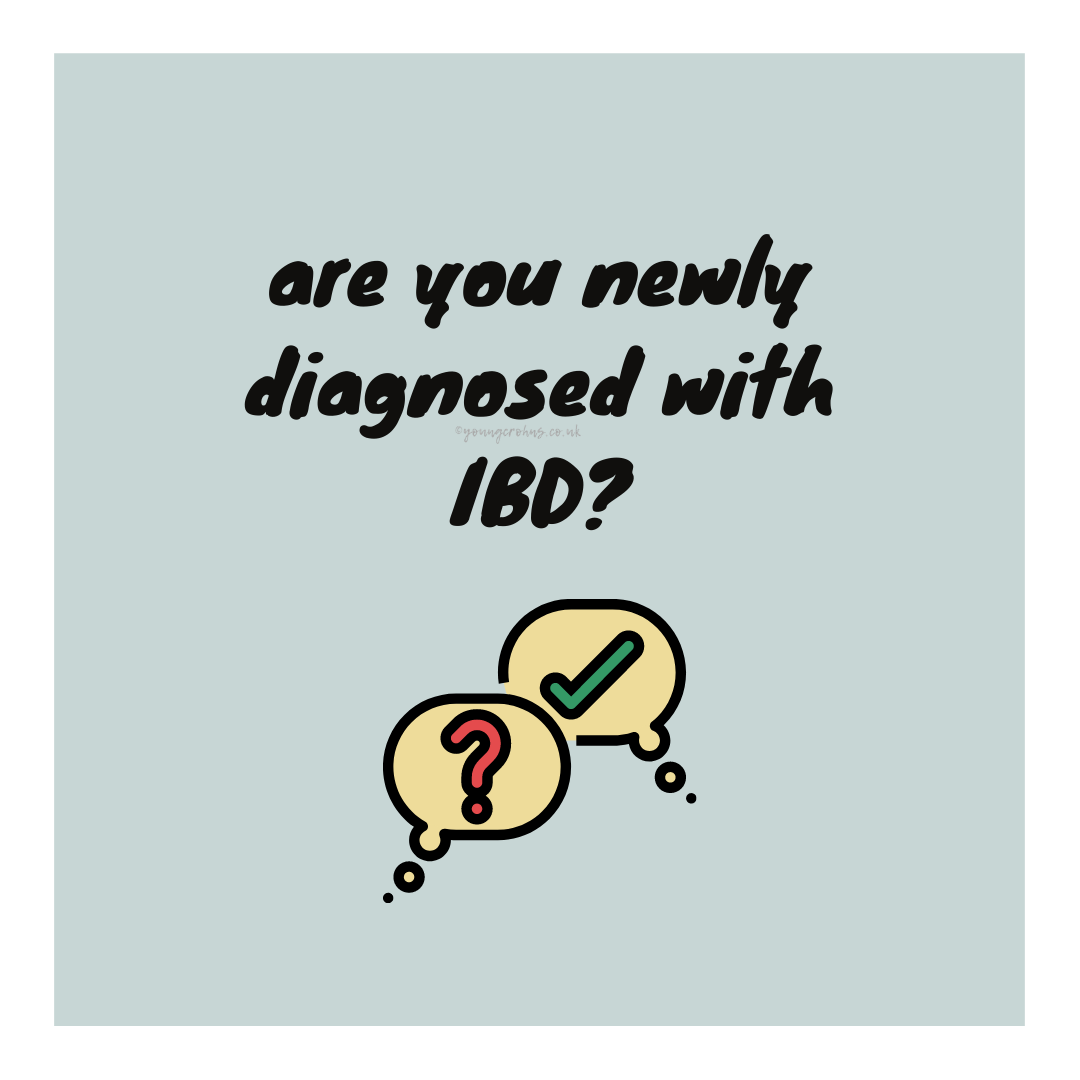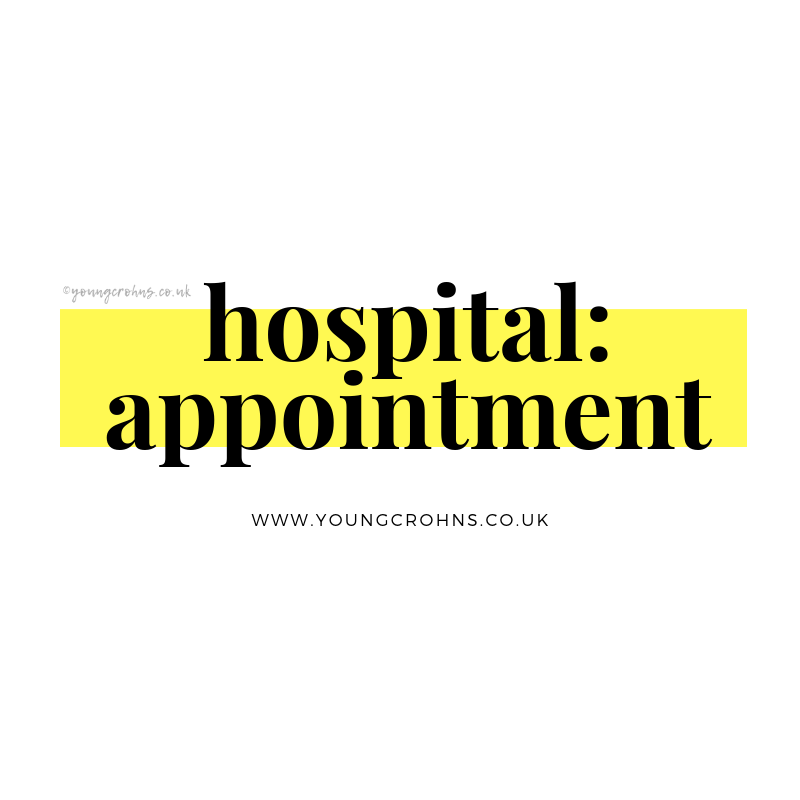
Newly Diagnosed
What should I do if my symptoms worsen whilst waiting for my first appointment?
- in case of emergency, contact 999
- for urgent queries contact your GP or 111
- for an increase in symptoms of your IBD contact the IBD advice line
Join Crohn’s and Colitis UK (CCUK)
The national charity for those affected by Crohn’s Disease and Ulcerative Colitis. It is an invaluable source of information and support from diagnosis, treatments, surgery and lifestyle changes. Information is verified and approved by medical professionals, so a source you can trust. Latest updates on their news section and information about research projects and opportunities. You can join here.
Get a can’t wait card –
avaliable from joining CCUK. Can be used to show when needing to access a disabled toilet.
Use of accessible toilets & radar keys –
Radar keys can open all of the accessible toilets in the country. Can be ordered from here but might also come from CCUK welcome pack.
Keep an emergency pack in the car or your bag.
Always handy to have items such as wet wipes, toilet roll, nappy sacks, spare underwear, pads.
Tips on diet –
Diet is a highly contentious subject in IBD so it comes loaded with judgement. It’s best to be aware that avoiding foods per se is demoralising at times, but if you keep a food diary – which you can find here – and work out which food trigger symptoms or a reaction, you can have a relatively healthy and varied diet. There are some common foods that do cause issues – you can read more about those here – but this is not to say it will be the same for you. Listen to your body.
Try to not listen to scare stories –
It can be really tempting to want to find a good news story for your IBD and end up finding really scary ones instead. Be reassured that this is can be a minority of patients, not the mass. For the majority of patients, treatment with effective medicines, surgery & diet, you can remain very well with IBD.
A suggested list of what to take if you go into hospital –
It can be a really good idea to have a ‘hospital bag’ packed, just in case you do find yourself unwell suddenly and in need of admission. Essentials can be your latest clinic letter, loose and comfortable clothes, book, medication & repeat prescription, music, charger, headphones, wet wipes.
How to get the best out of your hospital appointment –
Appointments can be scary and overwhelming at times, so preparing questions ahead of time is always a good idea – such as “what are the side effects of X medication, how will I know if I need more urgent care, how long do you expect this to take to work, what are you looking for in an X procedure,” you can always consider taking someone with you – not during the current pandemic, unfortunately – but don’t be afraid to voice your concerns over anything you have experienced or felt since your last appointment, it could all be relative.
Don’t be shy about your bottom/talking about your bowels.
When you are first diagnosed you can be very reluctant about being examined and talking about bowels/bowel symptoms. Try and remember that your medical team talk about these things all day, so won’t be embarrassed. If anything, being honest about them can help them help you in a more effective and efficient manner.
Be honest about how you feel.
Putting on a brave face and pretending all is ‘well’, won’t help you in the long run.
Details of local support groups.
There are lots of online groups which offer support and education about all aspects of IBD. CCUK have local support groups which do meet regularly – you can find out your local one here – but there are also individuals online who are happy to talk to you and offer reassurances. Please be aware, that these people are individuals who live with IBD themselves and have their own journey, so be respectful of that when seeking advice and help. If it’s urgent, always contact your IBD team directly.
Tips on bowel investigations.
Part of having IBD is regular bowel investigations. This can be a full colonoscopy, a Flexi sigmoidoscopy or a small bowel MRI scan. Each of these tests will involve drinking some sort of preparation to clean the bowels for a camera or contrast dye.
The general advice on drinking any laxative bowel preparation for an endoscopy is to move to a low residue diet 3-5 days ahead of your scope, before beginning the preparation. This is most palatable drunk chilled, with a flavouring and through a straw.
The preparations cause frequent loose stools in order to empty your bowel, so have a barrier cream to apply each time you open your bowels eg Sudocrem and having moist wipes is also good advice.
Prep takes between 8 to 24 hrs to work, and this depends on what time your procedure is booked for. Always follow the hospital instructions for timings and volume of prep, as this will help them get the best results.
You will be offered sedation for the scopes, which you can choose to take or deny. This is a personal choice and depends on how you feel about the scopes themselves. As a first time, it might be worth having the sedation just to ensure you are comfortable.
Medications to avoid.
It is best to check with your IBD teams about what over the counter medications you can take eg painkillers, diarrhoea tablets. As a general rule you should avoid the pain killers known as anti-inflammatories (NSAIDs) – ibuprofen, naproxen and high dose aspirin – as these can aggravate flare-ups.
Tips on what to tell your family/friends/work about your diagnosis.
to be added
Educate yourself as much as you can through reliable sources.
These sources should be verified and overseen by a relevant medical professional. Examples of these: CCUK publications, IBD Relief and RCGP Toolkit. This way you can have more control and have more effective discussions with your medical team.
Not everyone has diarrhoea, or loses weight, has pain, loses blood.
Everyone is individual so try not to compare.
List of relevant telephone numbers/emails etc
to be added
Prepaid prescriptions certificates.
These are certificates that you can purchase to help with the cost of medications. A pre-payment is usually for a year and will be cost-effective if you require two or more dispensed prescribable medications each month. You can apply for one here. A medical exemption is another type of certificate which allows free prescription charges if you have a stoma. Typically this is for patients who require their stoma for more than 3 months and is usually applied for after surgery as it requires some hospital information. You can read more about this here.
Check with your medical team about anti-diarrhoea medications.
Antidiarrhoeals such as Imodium or Loperamide work to slow down the spasms within the gut to help aid water reabsorption by the digestive system. They can be very helpful but can interact with certain IBD medications, and are not suitable for every IBD patients. If you suffer from strictures they can actually cause constipation if incorrectly dosed.
Loperamide is generally considered the safest antidiarrhoeal – but should not be taken by anyone having a significant UC flare-up.
Other OTC medications which you should also discuss with your IBD team for its suitability for your own IBD are:
- Laxatives (Movicol)
- Antispasmodics (Buscopan, Colofac, Spasmonal)
- Bile Salt Binders (Question, Colestid)
- Bulking Agents (Fybogel, Isogel, Normal)
- Analgesics (Ibuprofen, Diclofenac)
You can read more about these medications in the CCUK ‘Other Treatments’ booklet.
Get a good pair of scales at home.
add more here
Details of the IBD specialist nurses team.
Who they are, what they do, when you should contact them but equally important is when it is not appropriate to contact them. Perhaps a ‘who to contact and when’ list would be helpful.
Buy a thermometer.
Really simple and basic but often overlooked, a good thermometer will keep you sane during those hot and sweaty nights with steroids and new medications, like a safety blanket. You can get great digital ones now, either at your pharmacy, major supermarkets or online at Amazon.
Stock up first aid kit.
Every house should have one but an IBD specific one is great for all those good emergencies that might come up.
- Spare underwear
- Disposable gloves
- Bottled water
- Wet wipes
- Liquid pain relief
- Imodium
- Nappy bags for disposal
- Body spray
- Hand sanitiser
- Toilet roll or tissues
- Sudocrem
- Spare set of stoma products for a complete change including scissors



